Peter MALONE
Saturday, 09 October 2021 12:59
Evening Shadows
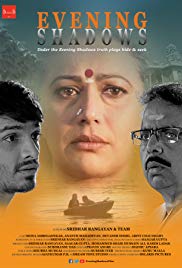
EVENING SHADOWS
India, 2018, 102 minutes, Colour.
Mona Ambegaonkar, Devansh Doshi, Ananth Narayan Mahadevan.
Directed by Sridhar Rangayan.
Evening Shadows is an Indian film that was screened widely, at a number of festivals.
The subject of the film is topical, especially in India, highlighting legislation about homosexuality, aspects of criminality, protests against the legislation.
The film offers an opportunity, a fairly gentle opportunity, a kind of PG-rated opportunity, for Indian parents to look at gay issues for their children, the difficulties for their coming out of the closet, cultural and social stigma.
The film focuses on a young man who has become a celebrity photographer in Mumbai and lives with his partner, his family thinking that he simply has a roommate. He returns to his family for some religious ceremonies, they being unaware of his sexual orientation (except an uncle who propositions him on his return and it is revealed that the uncle initiated him into sexual behaviour). While watching television news about the legislation, the young man’s father states that the behaviour is disgusting and the perpetrators should be executed.
The young man is cheerful, loving with his family, his father expecting him to enter into an arranged marriage with a childhood friend. Family and people in the town readily gossip about the fact that he is not married and speculate why.
His mother, who had not met her husband before the wedding, is a genial woman, but quite oppressed by her humourlessly domineering husband, treating her like a servant, dismissive of her, a dramatisation of an exceedingly Indian-cultural patriarchy.
The young man is in contact with his roommate by phone, conscious of legislation and voting about homosexuality on that day.
The young man takes mother for a drive – and, so much of the film is very pretty, beautiful landscapes and water in this area of southern India. Eventually, he tells the truth to his mother and she is extremely shocked, sad, finding it difficult to cope. She imagines him dressed in cross-sexual clothing, he imagining her to be so upset that she would kill herself.
When they are obliged to stay the night at a hotel because the car breaks down, his mother gradually begins to understand – and, on the return home, when the father finds photos of his son and his roommate on his computer and formulates against his son, fighting him, ousting him from the house, his mother stands her ground, a fine speech about her role as a mother, nine months having him in the womb, bringing him up as a child, as an adult. The father is stunned by this outburst – and the film ends without the father really reconciling with his son.
Many Western culture audiences have been through many films on this theme – so it is interesting to see an Indian version, presented more quietly than might be expected, an emphasis that gay relationships are based on feelings, love, relationships more than any sexual encounters and behaviour.
Published in Movie Reviews
Published in
Movie Reviews
Saturday, 09 October 2021 12:59
Hobbs and Shaw: The Fast and the Furious
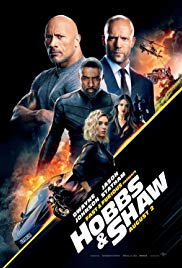
HOBBS AND SHAW/THE FAST AND THE FURIOUS
US, 2019, 135 minutes, Colour.
Wayne Johnson, Jason Statham, Idris Elba, Hattie Kirby, Helen Mirren, Eddie Marsan, Eliana Sua, Cliff Curtis, Lori Pelenise Tuisano.
Directed by David Leitch.
The fans of The Fast and the Furious franchise – and they are legion, increasing over the almost 20 years of the franchise – need no introduction to Hobbs and Shaw. Wayne Johnson’s special agent Hobbs has been in involved in all kinds of fast and furious escapades. Shaw, on the other hand, Jason Statham, was on the wrong side of the law in the fast and furious shows. But, he there is some reluctant working together, capitalising on the mood of the hostilities.
Interestingly, one reviewer, not liking this show, noted that Hollywood has been making action adventures for the mentality of 12-year-olds. He dismissed this show by saying that it was designed for six-year-olds. Six-year-olds? Is this big screen extravaganza how six-year-olds tick?
Rather, fast and furious fans and audiences, whatever the age, whatever the mentality, can recognise that this is a big-screen version of a comic book. The characters are larger than life. The situations have been invented rather than reflecting reality. The action goes way beyond the probable (a strong ingredients of its being attractive). Subtlety is not the first quality in the film-makers’ mind, whether it be the writers enjoying thinking up this kind of action concoction, or the director (David Leitch in this case who has been stunt advisor on many a show). These days, thank goodness, they have to add a little emotion to temper the adrenaline, Hobbs having a little daughter (chatting to her on the phone while Shaw is in grave danger behind him); Shaw having his roguish old mother (Helen Mirren again) in prison but reconciling with son and daughter.
And there is a mysterious leading lady, caught up in all the action – but no romance – played by Hattie Kirby (who played Princess Margaret in The Crown).
Maybe that is enough of a review, highlighting what the filmmakers have got up to, to make the biggest and noisiest action show that they can, relying on the larger-than life screen presence of the cast, getting in as much stunt work as they can – and they do, especially the finale on Samoa where Hobbs goes back to visit his family, reconcile with his brother, re-establish his roots and introduce his daughter to them. Just to say that Wayne Johnson lassoos a plane, a number of cars link up to try to drag the plane down-to-earth, some swinging way over the water and cliffs.
So, not a film for classic critique, rather a show that audiences can enjoy or not, depending on their tastes and interests, and encouraged by some scenes during the credits that we haven’t seen the last of Hobbs and Shaw!
1. The Fast and the Furious series, Hobbs and Shaw and their roles, clashes, audience expectations of the spinoff?
2. The British settings? The range of London settings? Streets and chases? Laboratories? Espionage and authorities? The American sequences, Hobbs and his daughter? The transition to Samoa (filmed in Hawaii!)?
3. The range of stunts, action, fights, car chases, shootouts? The final battle and the range of instruments, including traditional? CGI for the stunt work? The musical score?
4. Hobbs and Shaw in the previous films? The on-screen personalities of Dwayne Johnson and Jason Statham? American and British? Clashes, collaboration?
5. The film as a large screen version of a comic strip? Big, simplistic, unsubtle – and fans response to this?
6. The plausibility of the plot – and whether that mattered? The virus, its power, Brixton and his being transformed into a human/robot? The search for the virus, Hattie and allowing it into her, the need to get it out, in its container?
7. The introduction to the plot, London and the confrontation, Brixton and his men, Hattie and her stealing the virus, the pursuit? The role of the inventor, his collaboration – and with the flamethrower?
8. Shaw, in England, his lifestyle? Becoming more dapper? Going to the prison, his visit to his mother, audiences enjoying Helen Mirren, presence, accent, old school? And the audience enjoying the visit to the prison at the end, mother with son and daughter, plans to get her out?
9. The contrast with Hobbs, his young daughter, breakfast with her?
10. Each of them getting messages, split screen, not wanting to work with each other? The clash of personalities – in reality, mock clashes?
11. Their initial work, Shaw tracking down Hattie, the irony that it was his sister? His knowing her background, memories of the past, their mother evoking them, playing together, rivalry in collaboration? Shaw going to criminal work? Hattie going into the community? Relationship with Brixton? Hobbs and his research?
12. The different styles, the investigations, having to work together, the clashes with Hattie, the collaboration? The confrontations with Brixton, his powers, the cyber work inside him, his having to be recharged?
13. The range of action episodes audience enjoyment, fights, dangers, chases, stunts?
14. The decision to go to Samoa, Hobbs and the clash with his brother, away for 25 years, his mother welcoming home, his brother suspicious? The whole community working together to offset the attack? The old weapons? The brother and his work on the virus?
15. The battle on Samoa, Brixton and his soldiers, the control, the fight? The old warrior battles of the past in the 21st-century?
16. The attack, the stunts, Hattie with Brixton, the vehicles, the plane, the lassoo, Hobbs holding the plane, Shaw driving, the range of cars, holding the plane, swerving out over the ocean, bringing the plane down, Brixton and Hattie? Brixton losing his power?
17. Happy endings on Samoa, family, the little girl meeting her grandmother? Happy endings in prison with mother and her son and daughter? And the further jokes during the credits – intimations of sequels?
Published in Movie Reviews
Published in
Movie Reviews
Saturday, 09 October 2021 12:59
Late Night
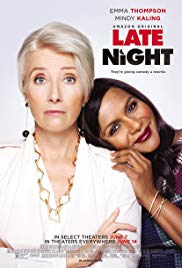
LATE NIGHT
US, 2019, 102 minutes, Colour.
Emma Thompson, Mindy Kaling, John Lithgow, Hugh Dancy, Reid Scott, Denis O'Hare, Max Casella, Paul Walter Hauser, Ike Barinholtz, Amy Ryan.
Directed by Nisha Ginatra.
Audiences in the US, and audiences beyond the US, like to relax in the evenings with the television Late Night Shows, loyal to the hosts over the years, even decades. Generally they are male (we remember Johnny Carson, David Letterman, John Oliver, Jimmy Kimmel, Jimmy Fallon…) But, there has been Whoopi Goldberg… We watch the shows, enjoy the jokes, the monologue commentaries on politics and society, the guest interviews with their insights (and their promotions).
But, what are the host really like offscreen? And who does all the writing? The producing? The lining up of guests…?
Well, this very entertaining film offers some answers (and suggestions). It can be seen as all the more authentic because it was actually written by its co-star, Mindy Kaling, who has a substantial list of writing credits, especially for the American version of The Office and her own show, 117 episodes, The Mindy Project. In Late Night, she plays Molly, who works in an industrial plant but gets the opportunity in a competition to have an interview with the star of a Late Night Show, gets a job (they decide they need a woman on the writing staff which is all exceedingly male and white), is very tentative at first, at moments vulnerable, but showing she has an ear and an eye for jokes. Perhaps she drew on her early ventures into writing 15 years earlier to create the character of Molly and her travails.
Star of the show, however, in every aspect, is Emma Thompson, who, like Mary Poppins although she would never proclaim this in real life, is “practically perfect�. She is Katherine Newbury, star of her show for almost 30 years, very British, elegant in style and dress, precise in articulation, a celebrity who is very much admired. Except by the head of the network, Amy Ryan, who warns Katherine Newbury that she underestimates her audience, is snobbish in her attitudes, and that it is time for the show to end. And, they have a young stand-up comic, played by Ike Barinholtz, purveyor of really crass jokes, to take her place.
Katherine Newbury is charming on screen, thanking the audience for the privilege of letting her have time with them. But, offscreen! (Make that double !’s.) She has no personal contact with her team of writers, routinely, but slackadaisically, churning out material for her, hanging on to their jobs). When she does meet them she can’t be bothered remembering the names and numbers them off and addresses them by their number. Her loyal producer, Brad (Denis O’Hare) acts as a liaison for her in all the practical details.
With the threat to her show, the situation changes. She is also advised that she should have a woman writer – just at the time that Molly turns up from the factory for the interview and instantly gets the job (and is of Indian background which is an extra bonus). It should be mentioned that Katherine has one saving grace, her love for her husband of many years, John Lithgow, a pianist who is now suffering from Parkinson’s. The tenderness in the film comes principally from their scenes together.
Actually, the dialogue is very enjoyable to listen to, Mindy Kaling certainly has an ear for jokes, irony and jibes, but also for a lot of truth in deeper interactions.
Katherine, of course, has to learn to be human and is very fortunate that Molly is able to save the day for her several times. And, while audiences might think it will be plain sailing when Katherine is more humanised, there is a development of the plot that will surprise – and has some momentum that could sabotage Katherine’s life.
If you enjoy clever and often smart dialogue, if you enjoy strong performances, especially from Emma Thompson, if you enjoy a bit of stirring up the background behind the scenes of top television shows and their anchors, then this is definitely for you.
1. The background of American night television shows, the anchors? And behind the scenes? The title, Katherine and her program, a television host, the nature of the shows, the jokes, the interviews, monologues, guests and issues?
2. The picture of the writing staff, large staff, their hack work, writing material, its being rejected not being used? Their ambitions? To hang on to their jobs?
3. The offices in the television building, the stage? Homes and apartments? Streets and clubs? The musical score?
4. Mindy Kaling as the writer of the screenplay, insights into the television shows and their background, personalities? The clever and humorous writing? Her performance, sympathy, anchoring the story in reality?
5. Emma Thompson has Katherine, her appearance, age, manner, from England, her on-screen personality, her delivery, rapport with the audience? The contrast with Katherine offscreen, haughty, impersonal, yet depressed, love for her husband, harsh with others, her goal of excellence?
6. The show over the years, her attitude towards her audience, the privilege of their time, yet her snobbery? The head of the network, coming to see her, dislike, the threats, the termination of her show?
7. Danny, the stand-up comedian, the crassness of his show, Katherine’s shock that he was to succeed her, meeting with his agent, the head of the network? The device of having him on the show, to indicate the transition and her approval, his crassness, her outwitting him on screen, his disgust, his anger at his agent?
8. The range of writers, Charlie and his charm, Tom and his father, having the position, past friendship with Charlie? Writing the monologues? The range of the others, slack behaviour, gossiping, alerted to Katherine’s arrival, her calling them by numbers and not by name? The contributions?
9. Katherine on screen, her style, Molly looking at past examples? The range of jokes, the interviews, the You Tube filmmaker and Katherine mocking her, the reaction of the guest, calling Katherine out, and the proliferation of the scene online?
10. Walter, Parkinson’s disease, his support of Katherine, over the years, the story of his leaving his wife and children for her, his skill at music, the effect of his disease? The shock of the revelation about her affair, hurt? The phone call, the studio, talking with Katherine, her one sin and the
million good things, forgiveness?
11. Molly, her work in the plant, some stand-up comedy, seeing the advertisement, the opportunity to meet Katherine for an interview, in the waiting room, the others waiting for jobs – and the scene where the young man wanted time off from his family and was fired by Katherine? Brad and his continued presence, support, mopping up? The issue of the hiring of a woman? Molly and Katherine’s presence, awkward, her being hired, a woman, racial minority? Her eagerness, personality, Indian family, living with them?
12. The men, male, white? The lack of women in the office, the lack of minorities? (And the final sequence multi-minority?)
13. Molly on her first day, being number eight, having to sit on the bin, her honesty, Katherine’s reaction, the demand that she provide solutions, her writing, the joke about menopause, accepted, Katherine’s fear and its being omitted?
14. Charlie, his approach, stand-up comedian, her going to the gig, the sexual advances, her attraction but her refusal, after three weeks? The revelation of his affair with Katherine?
15. Molly, being accepted, her contribution, sharing the studio floor with Tom? His talking with her, admiration for her, his past?
16. Molly, preparing the stand-up evening for lung cancer? Katherine’s demands, that she stay, Molly defying her, her gig, Katherine following her – going on stage, the flat jokes, the funny jokes, Molly re-hired?
17. The decision to reshape Katherine and her off screen personality? The PR expert and Katherine’s reactions? The family party and the Germans coming, the interviews, Molly and Tom, finding Walter, their talk, Molly saving the day with the press? Katherine grateful?
18. The makeover, the range of jokes, movie personalities, Republican senators and menopause? The young woman and her series, wanting a hug? The audience response? The group, their work, yet Molly going – Katherine coming, climbing the steps, to visit her?
19. The revelation of the scandal, the headlines, Bill Maher’s denunciation on television, Katherine’s dilemma as to telling the truth on television or not, letting it blow over? Talking with Walter?
20. Molly, the advice, her watching Katherine on television, telling the truth, reprehensible behaviour by both men and women, the audience applause?
21. Katherine saved, the head of the network conceding that she had done well, Molly continuing to write – and the multi--racial staff and the women?
Published in Movie Reviews
Published in
Movie Reviews
Saturday, 09 October 2021 12:59
Loft
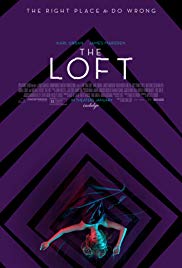
THE LOFT
US, 2014, 108 minutes, Colour.
Karl Urban, James Marsden, Wentworth Miller, Eric Stonestreet, Matthias Schoenaerts, Isabel Lucas, Rachael Taylor, Rhona Mitra, Valerie Cruz.
Directed by Erik Van Looy.
The loft was originally a Dutch film in 2008, directed by Erik Van Lloyd. He had the opportunity in 2014 to remake his film in the United States with an American cast.
The loft of the title is a spacious apartment, concealed from the rest of the building, designed by the architect, Vincent, played by Karl Urban. He invites his friends to share the loft, each having a key, a rendezvous for their illicit affairs – with the condition that they inform each other about its use.
The film opens with the death of a young woman in the loft and Vincent discovering the body. He summons his four friends and their a desperate discussions about how to conceal the death and get rid of the body. An elaborate scheme is invented.
In the meantime, there are many flashbacks explaining the characters of each of the friends, their bonds, their family situations, wives, and the motivation for their infidelities. The cast of the film is quite strong (and international with Karl Urban from New Zealand, but Matthias Schoenaerts from Belgium, Isabel Lucas and Rachael Taylor from Australia, Rhona Mitra from the UK).
The plot becomes even more complicated – perhaps the writer and director influenced by Agatha Christie and the Orient Express.
1. The director’s remake of his Dutch film? The American setting, cast
2. The title, the loft itself, visuals, interiors? Its significance, the agreement by the men, their personal use, the limited keys, keeping each other informed? The sexual atmosphere, infidelity, exploitation?
3. The American city, architects and buildings, design, interiors? Homes and apartments? Hotels and clubs, San Diego? The musical score?
4. A murder mystery, solving it? The plot twists? Satisfying explanations and motivations?
5. Vincent, architect, age, marriage, his wife and her work, the brittle relationship? Seen together at functions? The opening of the building? His friends, their bonds? His showing them the loft? His explanations, their agreement, Chris and his hesitation? Ultimately all agreeing? Sex, liaisons, infidelities?
6. The dead girl in the loft? The blood, the handcuffs? Vincent and his arrival, bewilderment? Summoning the rest of the group, their arrival, their alibis, explanations, upset? The presence and absence of quays? The phone call about the inspection for sale?
7. The secrecy, cutting Vincent out? His deceptions and infidelities to all of them? The revelations about Vincent? The men knowing, their revenge on him? The visualising of each of the liaisons with the women? Sarah, in San Diego, Vincent and the attraction, her behaviour, the stripping, Luke watching? Audiences thinking he was watching Vincent? The continued relationship, taking Sarah to the loft, breaking with her?
8. Chris, his wife, morose, preparing the meals, his friends coming for dinner? Her behaviour, condemnation? Chris, the family, fidelity? The encounter with Anne, tease, the irony of her being paid by Vincent? Chris and resistance? Succumbing? The relationship, his infatuation? Her trying to put him off? His taking her to the loft?
9. Anne, her presence, glamour, with the head of the company, on the payroll, the encounters with Chris, seductive, explanation of her background, warning him off? His pursuing her? Her being paid by Vincent?
10. Marty, not so attractive, his wife, the relationship, his flirting, sexual language, his work, his infidelities, his wife leaving him, her affair with the Vincent, his desperation, pleading, the truth?
11. Luke, in the background, his wife, at the parties? In San Diego, Sarah? Seemingly ambiguous and sexuality? The revelation of his relationship with Sarah?
12. Philip, his relationship with Chris, half brother, his manner, engagement, the father of his wife? Rough, violent? Sadomasochistic touches? Using the loft? The betrayal of his sister, his anger? His wife?
13. Philip’s father-in-law, business, promises to Vincent about contracts? His being seen in Las Vegas, Vincent’s hold over him, his hold over people? Business success? Philip and his relationship with him?
14. The accumulation of motivations, the revelations of what it happened, Sarah in the loft, the injection, her death, setting up the murder situation to blame Vincent, Philip and the knife and the blood?
15. The complexities of the phone calls, their presence, the killing and the timing of the injection? The police investigations, the interrogations, each being questioned, the responses, alibis, blame, Vincent?
16. Chris, the final confrontation with Luke, the truth, his lies, his vengeance? The confrontation on the balcony, his wanting to kill Chris, his death?
17. Psychological drama, the men, their identities, sexuality, fidelity and infidelity, bonds of friendship, the use of the loft? Vincent and betrayals? Vengeance?
Published in Movie Reviews
Published in
Movie Reviews
Saturday, 09 October 2021 12:59
Loev
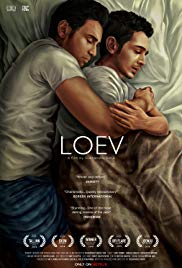
LOEV
India, 2015, 92 minutes, Colour.
Dhruv Ganesh, Siddarth Menon, Shiv Pandit.
Directed by Sudhanshu Saria.
As the 21st-century has developed, the Indian film industry has ventured into stories about same-sex relationships, difficult because of anti--homosexual legislation in India.
Probably one of the best films for audiences to see the impact of homosexuality, being in the closet, living a somewhat secret gay life, opening up to parents who are shocked, is the 2018 film Evening Shadows. While it may seem “old hat� to film viewers from Western countries, it is a film that can be watched by parents, challenged but not a shocking treatment, so that they might be able to understand and moved towards acceptance.
Loev, while it has an Indian setting, the city of Mumbai, excursions into beautiful mountainous countryside, beautiful, pretty to look at, the style of filmmaking and storytelling is more Western.
In the first half of the film, while there is dialogue and the domestic situation, a couple going away for a weekend to a resort, some talk, some modest sharing of a room and bird, it is in the latter part of the film that there is more explicit behaviour and, surprisingly and shockingly, especially for some gay audiences, a rape sequence.
We are introduced to characters – that may not be such an accurate description because we are presented with characters, though very little about them, and do not learn much more. Rather, they are introduced and we discover something of who they are in terms of their behaviour and communication. The central character is a young man, a musician, sharing an apartment with a quite campy and seemingly irresponsible producer. They argue about the cutting off of electricity and who should pay the bill.
However, the musician is at the airport to meet a friend, a businessman coming in from New York, continually on his mobile phone and then Skyping. The relationship between them is suggested rather than made particularly explicit. There is some moodiness between them, indications of the businessman’s New York background, marriage and son, but they spend some time walking and climbing in the beautiful landscapes.
This businessman has to attend a meeting with agreements that seem to have fallen through. On his return to the room, this is where the rape sequence takes place, the seeming regret of the perpetrator, the complete passivity, even acceptance, by the partner.
The rest of the film, there is a dinner at a restaurant where they meet up with the roommate and his young associate, drinks later, conversation – and the businessman going to the airport to return to New York, thinking about what has happened, and the two men going home to their apartment.
Bloggers have commented on the beauty and the sensitivity of the film – while others are critical of the lack of background information about the characters and express some deep concerns about the rape sequence.
There is an element of sadness because the central actor, Dhruv Ganesh, died during post-production of tuberculosis at the age of 29.
Published in Movie Reviews
Published in
Movie Reviews
Saturday, 09 October 2021 12:59
Amityville Murders, The
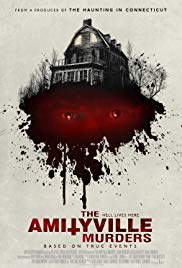
THE AMITYVILLE MURDERS
US, 2018, 97 minutes, Colour.
John Robinson, Chelsea Ricketts, Paul Ben- Victor, Diane Franklin, Noa Brenner, Zane Austin, Rebekah Graf, Lanie Kazan, Burt Young.
Directed by Daniel Farrands.
It is not surprising that there is a polarity of views on this film, yet another film about Amityville, the residence, touches of the supernatural, killings and hauntings. The film was released 40 years after the original The Amityville Horror – which led to so many sequels and variations as well as The Conjuring series with the focus on Ed and Lorraine Warren, professionals in examining haunted houses.
Some bloggers point out the inaccuracies in the portrayals of the characters, especially their ages. Others find it a telling representation of life at the time, violence in families, violent reactions.
The De Feo family lives in the famous house. Diane Franklin, who appeared in the second film, is the mother. Paul Ben- Victor gives an extraordinary vivid performance of a savage and angry father. There are various siblings but the focus is on the 23-year-old Butch (John Robinson) a drug addict, mixing with a similar group of friends, going down into a hidden room in the basement and reading a book from their grandmother which has diabolical overtones. There are strange occurrences, especially with coins.
There is a bonus for filmgoers with Lanie Kazan and Burt Young as the grandparents.
The film focuses on the hard life of the family, the outbursts by the father, his being in secret deals and stashing large amounts of money in his safe.
Butch has serious psychological problems, exacerbated by his father. Erratic reactions, he hears voices coming from the walls. Ultimately, he becomes violent, and kills the whole family except for one sister gone to visit the grandmother.
Final information indicates that he is serving a life sentence in prison.
1. Audience interest in Amityville stories? This story as a prequel to the series?
2. Amityville, Long Island, the atmosphere of the 70s, the activities in the home, the rooms, the basement, the secret room? The relief with the celebration of the party? The musical score?
3. The screenplay based on actual events and characters? How much liberty taken with the events?
4. The portrait of the family, the hard pressed mother and her love for her children, the violent father and his continual outbursts, harshness, physical reactions? The mother expected to stay for the children? The father and his deals, stashing the money in the safe?
5. The children in the family, their characters, daily life? Their parents?
6. Butch, his age, growing up, treatment by his father, his friends, their meetings, addictions and their effect? With his sister, the basement, the grandmother’s book? The mysterious action of the coins? His hearing voices?
7. The grandmother, the book, old traditions? Her grandmotherliness? The grandfather, the gifts of the cars? The sister eventually going to see
her grandmother, the explanations?
8. Butch, his deterioration, taking his father’s money to the basement, hearing voices in the walls? Their commands? His killing his whole family?
9. The credits information about Butch, the murders, in court, his sentences, in prison?
Published in Movie Reviews
Published in
Movie Reviews
Saturday, 09 October 2021 12:59
Midsommar
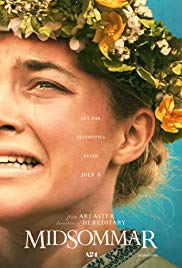
MIDSOMMAR
US Sweden, 2019, 147 minutes, Colour.
Florence Pugh, Jack Reynor, Vilhelm Blomgren, William Jackson Harper, Will Poulter.
Directed by Ari Aster.
Writer-director, Ari Astor, had made a number of short films before his feature film debut, Hereditary. It was well acclaimed critically and had quite a following – although, not from this reviewer who appreciated the technique but found the last part of the horror-fantasy too absurd.
In Midsummer, Aster takes for granted a great deal of pagan ritual absurdity (we hope) and incorporates it into the narrative.
We are immediately introduced to Dani, effectively played by the rising star of The Little Drummer Girl, Lady Macbeth, Fighting with the Family, Florence Pugh. She is nervy, apprehensive about her sister who is bipolar, the safety of her parents. And, we almost immediately see that she has good reason. They are dead. Dani is very nervy, continually phoning her boyfriend for years, Christian (Jack Reynor). Christian’s friends are advising him to break with her because of her pressures on him. Christian and his friends, Josh (William Jackson Harper), Pelle (Wilhelm Blomgren) and the intrusively obnoxious Mark (Will Poulter) are all involved in thesis work and their Swede friend, Pelle, persuades them to visit his home community in Sweden and to celebrate Midsummer – interesting for their thesis research. Dani is of two minds but eventually goes.
This is quite a long film, almost 2 ½ hours, and is never in a hurry. We are invited to accompany the friends to Scandinavia, to the northern summer, experience the midnight sun, meets the community and spend some time with them. We anticipate that after the welcome, the experience for the friends will be most unwelcome. And so it is.
This is mid-summer, pagan Scandinavian rituals, some elders, many young women, fewer young men, some children, are all dressed in white, bright sunshine white, while the guests remain in their visiting clothes, not white. Their time there will be 10 days of festivities, many rituals, well-prepared meals at long tables, communal living in a vast dormitory with roof and walls covered in bright paintings with mythological touches. And there is dancing and, eventually, the Queen of the May.
While all this may seem attractive, even innocent, there are some ominous signs, especially tablets and drinks which lead to hallucinatory experiences.
Despite the bright sunlight, some of the characters in the community act in very creepy ways. Dani is well received and is encouraged to participate in the increasingly frantic dance of the young women to determine who will be the last one standing, Queen of the May. She is completely covered in flowers, presides at the meal, is reverenced. In the meantime, Christian begins to feel more alienated and becomes the focus of an elaborate sexual ritual.
The drama builds its tension – especially with the information that there are four phases of life to correspond with the seasons and at the end, at age 72, the only prospect for the members of the community is death, vividly dramatised. As is the ending, but even more alarmingly and vividly dramatised, ritual, sacrifice involving fire and a giant bear.
Because of its exotic settings, everything in the mid-summer sun, the film does remain in eerily in the memory.
1. Reputation? Horror film? In broad daylight?
2. The title, Scandinavian Midsummer, midnight Sun, the fields, the water? The buildings, dormitory and the interior paintings, the temple? The initial sequences in the United States? Overview, the interiors?
3. The musical score, the overtones of rituals, pagan rituals, songs? Chant?
4. The introduction to the characters, Dani, her nerves, phone calls, the absence of her sister, concern, her parents? Phoning Christian? Christian, the discussions with his friends? Mike and his interventions, wanting Christian to break with Dani? Her continued calls? The fire, her sister, the death of her parents? The overall effect on Dani, tensions, open to disturbance?
5. The men, their friendship, their studies, theses and topics? Discussions, on personal relationships? Mike and his insensitivity? The decision to go to Sweden, the discussions, Christian and his decision, including Dani, the ambiguity of her reactions, agreeing to go? On the plane, the views from the plane?
6. Pelle and his story of his community, the remote village, the personalities? His promise of celebrations? The trip in the countryside, the arrival, the immediate welcome? Each adapting to the situation, the drug and hallucinations, asleep in the hills? Market and the problem of the midnight sun?
7. Pelle, studying overseas, persuading his friends to come to his community? His role in the community? His contribution to the sinister atmosphere?
8. Midsummer, the pagan traditions, the celebrations, the enclosed community? The elders and their welcome, explanations? The white clothes? The women, the authorities, the many young women, the fewer young men, the children?
9. The introduction to the buildings, the isolated temple? The huge dormitory, the beds, the range of paintings in the themes? Mythologies?
10. The celebrations, the rituals, music and dancing, the dress, the wreaths?
11. The meals, lavish, the tables on the rows, the formalities? The ancient couple emerging, everybody differential, waiting for them, the celebration of the meal? The visitors and their not wearing white, yet their being welcomed, eating at the table, puzzles for them?
12. The elderly couple, going to the top of the cliff, throwing themselves over, the explanation of the four seasons of life, death at age 72? The man not dying, his face being battered? The reaction of the visitors? The acceptance of the community?
13. Mike and Josh, Josh’s character, his thesis and investigations, Christian and his change of attitude, his decision about his thesis topic, Josh feeling aggrieved? And then Josh, his being battered – by whom?
14. The dancing, the young women, Dani and her being invited to dance, the continued dancing, the frenzy, the women dropping out, the final group, Dani and the world, her being affected, hallucinations, bumping the final dances, her being crowned Queen of the May? The previous discussions about the Queen, the photos of the previous winners? Her being crowned, dressed in flowers, presiding at the meal?
15. Christian, his being accosted by the woman Elder, his being chosen to impregnate the girl, his reaction, the drugs, his observing Dani as the Queen, his being taken into the heart, the naked women, the sexual encounter, the aftermath, his running through the fields, naked? His collapse? His sitting in the chair, his being bound, paralysed but conscious?
16. The buildup to the ritual, the background of the selection of victims, the willing victims, the ritual of choice, the role of the Queen of the May?
17. The presence of the Bear, the initial comments, it becoming part of the ritual, the slaughter? The skin?
18. The ritual, Christian within the bearskin? The other victims? The fire, the being consumed, burnt alive?
19. The conclusion of the ritual, the pregnant woman and continuity, Dani remaining in the community – the significance of her final smile?
Published in Movie Reviews
Published in
Movie Reviews
Saturday, 09 October 2021 12:59
Stuber
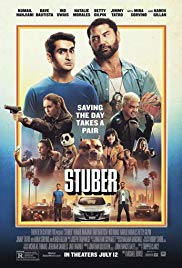
STUBER
US, 2019, 93 minutes, Colour.
Dave Bautista, Kamail Nanjiani, Mira Sorvino, Natalie Morales, Iko Uwais, Betty Gilpin, Karen Gillen.
Directed by Michael Dowse.
Probably best to give some considered thought about whether to see this film or not. It could be described as a film that undemanding audiences might watch on Netflix on a quiet night at home, continuing if it is entertaining, stopping if it does not appeal. Which it does mean that this is a film of mixed appeal (and not).
Basically, it is another police thriller, a tougher-than-tough police officer, played by former wrestler, Dave Bautista, whose partner is killed, is affected deeply, even suffering from sight disorder. But, of course, he is relentless – and in the opening minutes we have witnessed some really rough stuff, relentless fights. One of the basic appeals of the film is to those who like this kind of rough stuff.
However, the co-star is Kamail Nanjiani (who made a big impact with his autobiographical story, The Big Sick, and was highly entertaining as the voice of the tiny Pawny in the recent Men in Black International). Which means then that this is also an Odd Couple kind of police investigation, the contrast between brawn and brains, the contrast between gung-ho and an Everyman timidity, each, of course, learning from the other.
Nanjiani is Stu, an Uber driver, who is often picked on, is involved in with the son of the boss (who later reveals that Stu was his best friend because of the to-ing and fro-ing), is in love with a friend from school days who is opening up her gym for LA spinsters, he investing in it for love of her, she phoning him incessantly for consolation. Bautista is Vic, separated from his wife, loving his sculptor daughter and promising to be at her opening, but…
So, Stu arrives with his Uber, and has to follow Vic into all kinds of dangerous situations, dead bodies, shootouts, the visit to a vet who tends wounds, a whole lot of communications and confusions with iPhones, Stu frequently interrupted by the girlfriend, Vic worried about danger to his daughter, a visit to her show, the buildup to car chases, a final confrontation with the mastermind as well as the chief villain (martial arts performer, Iko Uwais, star of the Indonesian films, Raid). Mira Sorvino is present as a police chief.
Plenty of action for those who want it (tough and offputting for those who don’t), comic touches between the two central characters, sometimes funny, sometimes laboured, sometimes trying, Vic struggling with his blindness, crashing cars, poor aim in shooting… not always funny and is overdone, Stu’s girlfriend quite tiresome.
But, at the centre is the male macho American image, tough, seemingly unfeeling, relentless, being challenged by the meeker man with feelings. He, of course, has to rise to some violent occasions. Vic, on the other hand, has to acknowledge feelings, give up being so tough, even to final tears and a hug!
Published in Movie Reviews
Published in
Movie Reviews
Saturday, 09 October 2021 12:59
Crawl
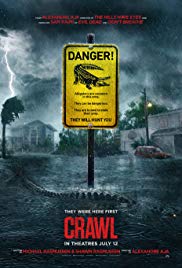
CRAWL
US, 2019, 87 minutes, Colour.
Kaya Scodelario, Barry Pepper.
Directed by Alexandre Aja.
In the 1970s and 1980s there were lots of animal terror of films as well as disaster films. Crawl is in this vein, reminding audiences of the terrors in those films, monstrous animals, people in peril, even echoes of other films, like the underwater swimming in The Poseidon Adventure.
If filmmakers want to make this kind of story, this is certainly the way to do it. It works. And, it is brief and certainly does not outstay its welcome.
The early part of the film gives audiences plenty of clues to be alert to and then to follow-up. The central character is a young woman, Hayley, played by British actor Kaya Scodelario. She has been trained as a swimmer by her coach father, Barry Pepper, devoting himself to her and her sister, neglecting their mother. We know that this swimming expertise will be important whatever the disaster.
And, there is disaster, a level 5 hurricane in Florida. Hayley’s father is not answering his phone so, despite all warnings, she breaks through a roadblock and drives to find him. Disaster, freely chosen, naturally follows. And, when she arrives at her father’s house, there is plenty of room upstairs but she goes down into a vast crawlspace, accompanied by her father’s dog. He has been injured and, as she revives him, the audience leaps out of its seats, an enormous alligator hurling through a window.
While some refer to this kind of story as a horror story, it is probably more accurately described as a terror story. And, not just one giant alligator, two. While there is some protection in parts of the crawlspace, the menace of the alligators means that father and daughter have to be on the move (plenty of opportunities for swimming) and plenty of giant snapping jaws.
There are some momentary hopes of rescue when a family of looters is seen in the supermarket opposite but, of course… And then some of the Florida troopers arrive searching and…
Kaya Scodelario and Barry Pepper are convincing as father and daughter, do have some moments of reprieve where they can have genuine family talk and, unlike some other disaster menace films from the past, there is no time for any mushy or soppy romance!
The director, Alexandre Aja has made a number of horror and terror of films and his judgement about how to treat the characters and situations, how to dramatise the alligators and their menace and attacks, seems to be just right for this kind of film.
At the end, to bring people back down to earth and soothe after the terror, the soundtrack plays a rather jaunty version, Bill Haley and the Comet, of See you later, alligator, in a while, Crocodile!
Obviously, not everybody wants to submit themselves to this kind of terror, and imagining what it might be like if we were in such a situation. But, for those who enjoy this kind of film, it fits the bill perfectly.
1. An old-fashioned style monster-animal threat, in the middle of a Florida hurricane?
2. An emphasis on terror rather than horror?
3. The Florida settings, the swimming pool, driving through the countryside in the increasing rain, the roads and the roadblocks, the house, upstairs, the extensive crawlspace? The flooded streets, the store? Boats, helicopters? The musical score – augmenting the terror?
4. The screenplay providing many clues, utilising the clues and connecting them?
5. Hayley, the importance of being a champion swimmer, the initial swim, her losing, the flashbacks to her past and her father’s encouragement? The phone call from her sister, concern about their father? Her decision to drive to find him, his not answering the phone? Driving in the rain, the roadblock, the friendly guard, her deciding to go through? The drive, the increasing rain, the atmosphere of the hurricane?
6. Searching for her father, upstairs, the dog? Going down to the crawlspace, its vastness, the water coming in, mess and muck, discovering her father, trying to revive him?
7. The alligators, their size, viciousness? The shock editing for audiences to jump? The alligator through the window, later the boat through the window, the continued vicious snapping of the alligators, wounding Dave, wounding Hayley, their presence, making sounds to attract them, the challenge to father and daughter, hiding, shelter, swimming? Hayley drawing on her skills, her memories and her father?
8. The looters, trying to signal to them, the alligators, the young man willing to help, their all being killed?
9. The troopers, their arrival, coming into the house, and their being killed?
10. The action taking place over a couple of hours, the intensity, the rain, the water coming in the channels, the eye of the storm, the discovery of the alligator eggs?
11. The impact of the action, the editing, the pace, credible behaviour, credible heroics?
12. The attempts to get to the roof, out of the crawlspace, the continued attack of the alligators? The injuries? Dave and the loss of his arm? The possibilities with the boat but its being swept into the house?
13. The roof, the opportunities during the experience for father and daughter talks, about the family, growing up, the alienation of the mother?
14. The helicopters, the flare – and just the right moment for the end of the film? And See you later, Alligator, to calm down audiences as they left the cinema!
Published in Movie Reviews
Published in
Movie Reviews
Saturday, 09 October 2021 12:59
Spiderman: Far From Home

SPIDERMAN: FAR FROM HOME
US, 2019, 129 minutes, Colour.
Tom Holland, Samuel L.Jackson, Jake Gyllenhaal, Marisa Tomei, Jon Favreau, Cobe Smulders, Zendaya, Jacob Batalon, Tony Revelori, Anghourie Rice, Remi Hii, Martin Starr, JB Smoove, Jorge Lindenborg Jr, J.K.Simmons.
Directed by Jon Watts.
An unexpectedly most enjoyable film. We have the history of Spiderman on screen from earlier, smaller budgeted films, to the range of films starring Tobey Maguire, then Andrew Garfield, then Tom Holland and his appearance in the Avengers movies. Tom Holland had his own film with Spiderman: Homecoming, linking him with Tony Stark, Iron Man, his being chosen to be Tony Stark’s successor (all illustrated in Avengers: Infinity War and Avengers: Endgame).
This time Peter Parker is on his own and Tom Holland consolidates his popular presence as Spiderman.
The screenplay of the film is like one of those old Saturday matinee adventures. It is geared for the young audience, after all Peter Parker is 16. There are plenty of adventures and special effects. There is shy romance as Peter tries to express himself and his affections for Mary Jane (Zendaya). There are lots of humorous quips. And there is a gigantic villain and the introduction of a new superhero, Mystero (Jake Gyllenhaal). It is one of those quite satisfying entertainments where one could echo the song, who could ask for anything more!
For those who like Samuel L.Jackson’s Nick Fury, he is prominent in this film, assisted by Maria Hill (Cobe Smulders). Marisa Tomei appears as Aunt May (looking and acting years younger than her predecessors, Rosemary Harris and Sally Field) and some more prominence by Tony Stark’s friend, Happy (Jon Favreau taking time off from directing The Lion King) and Peter Parker rather wary of indications of romance.
The action starts in Mexico with the appearance of a gigantic character, a broiling cloud of evil. And, Mystero, from another world or alternate world, comes to save the humans. So the action agenda is set and off we go to school where we find Peter, Mary Jane, his friend from the previous film, Ned, and other students off on a trip to Europe, accompanied by two teachers who are more comical than disciplinary.
Some of the sequences and locations, Venice, the Alps, Prague, Berlin, vast tulip fields in Holland, London, seem to have been photographed for tourist propaganda by the European Union! Of course, audiences will be delighted to appreciate all the scenic highpoints. But, the filmmakers really enjoy themselves with the monster reappearing and extraordinary destruction and devastation in the aforementioned locations.
Nick Fury, of course, wants Peter Parker to exercise his powers in the Tony Stark tradition to confront the evil and to collaborate with Mystero.
In the meantime, Peter has to avoid being recognised as Spiderman, to make excuses for his absence – which raises a lot of curiosity, especially for Mary Jane and for Ned, who knows the truth, to keep Peter’s cover.
The film continues very entertaining after a 180° twist.
This means more special effects, more action heroics, more potential destruction culminating in mayhem and devastation in London, especially of and around Tower Bridge.
All this provides occasion for Peter, who has doubted that he is the fit person in temperament, age, to be the new Iron Man in the Tony Stark tradition. But, urged on, with the help of Nick Fury and Happy, he saves the day. And, Mary Jane knows the truth. And 16-year-old Peter has learned about good and evil, life and love, ready for further adventures. And, with the entertainment value of this episode, we, the audience, are also ready.
(As always, there are scenes throughout the credits and a rather long jokey one at the end which may or may not work as a trailer.)
1. A story for a young audience, and the style of treatment to entertain them, and to entertain Spiderman fans of all ages?
2. Marvel Universe, the credits, the echoes of the different superheroes, the connections with Spiderman, Tony Stark and his heritage? Peter Parker and his age, Aunt May, school and friends?
3. The importance of the troubles, the title and Peter Parker far from home, the beauty of Venice, Prague, the Alps, Berlin, the tulip fields of Holland, London? Travel spectacle? The musical score?
4. The visuals of the stunt work, their abundance? Special effects?
5. Peter Parker, the explanation of the Blip and the pause with some people remaining at the age they were at the Blip while others developed for five years? Aunt May, different from the tradition, the encounters with Happy, the romantic touch? Peter and his suspicions?
6. Peter at school, the fellow students, from the first film, the teachers, Peter very quiet, looking forward to the trip, tired because of his previous adventures, the two teachers, their eccentricities?
7. The prologue, Mexico, Nick Fury and travelling, the effect of the monster, Quentin Beck arriving, his costume, from another world, to save the human race? The media and the name, Mystero?
8. Peter Parker, his attraction towards Mary Jane, friendship with Ned? Happy arriving, the warning about Nick Fury phoning, Peter ignoring him? Fury arriving, Ned and the dart, the confrontation with Peter Parker?
9. Peter and his wanting to go on the trip, Ned and his stories about bachelors in Europe? On the plane, Peter wanting to each exchange seats, the pretence about illness, the presence of Brad Davis and suspicions?
10. Venice, travel, the beauty of the city, the monster emerging, Mystero arriving to confront him? The elaborate fight, the effects, the destruction of the city? Mystero and his victory?
11. The Alps, the highway, the dangerous driving, the drones, going to the inn, the woman and the costume, the change, Brad and the photo? Peter Parker and his glasses, getting Edith to help, the pursuit, to destroy the photo? The dangers?
12. Prague, the repeated emergence of the monster, Mystero and the fight? Nick Fury and his presence, warning Peter to go into action? Saving the group, their going to the opera, bored, getting out, the fireworks and the parade, the attack? The Ferris wheel, Ned and Betty and their being saved?
13. Ned and Betty, Betty and her associate giving the initial tribute to the avengers and their deaths? Nostalgia? Betty strong-minded, becoming friends with Ned, girlfriend, doing everything together, Peter’s amazement? (And the later joke about friends breaking up but their still remaining friends?)
14. The drink with Quentin, heartfelt, Quentin and his speech about saving the world, Peter and his response, the teenager wanting to continue on the journey, to get close to Mary Jane? The glasses, the fact that he thought Quentin should be Tony Stark’s successor, handing over the glasses?
15. The truth about Quentin, his team, toasting them, the various functions, creating the illusions, the technical know-how?
16. Nick Fury, inviting Quentin to Berlin the meeting, that Peter should be there?
17. The discussions with Mary Jane, observing him, the truth about Spiderman, his explanations?
18. Berlin, Spiderman hurrying to the meeting, with the truth, confronting Quentin? The fights, the train, his landing in Holland, the tulip fields, friendliness, lending the phone, contacting Happy?
19. The arrival of the helicopter, Peter having to make decisions, Happy and the contact, frank talk with Peter about Tony Stark and his inheritance? The challenge, getting into his old costume, the flight, Happy contacting Nick Fury by code?
20. Quentin, the illusions, his explanations of all did for Tony Stark and his not being recognised or acknowledged? His wanting to destroy Peter and the other kids as witnesses?
21. The illusions in London, the stunt work, the bridge, the bus, the kids? The mayhem at Tower Bridge?
22. The final confrontation, Peter destroying Quentin? The role of Happy, of Nick Fury, of Maria?
23. Happy and Aunt May and Peter’s questioning?
24. The School, the adventures of the kids, the various ones mocking Peter as a weak? Yet admiring Spiderman? Back home with Ned, his breakup with Betty? Peter and Mary Jane?
25. The credits sequences – and Peter’s alarm at is being exposed by Quentin on television?
26. A Marvel Universe superhero film for all ages?
Published in Movie Reviews
Published in
Movie Reviews